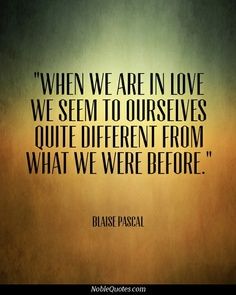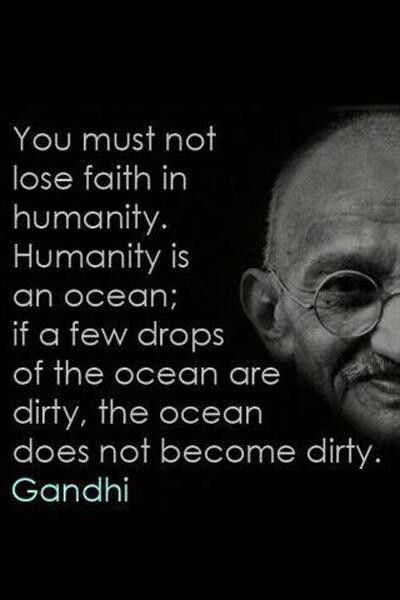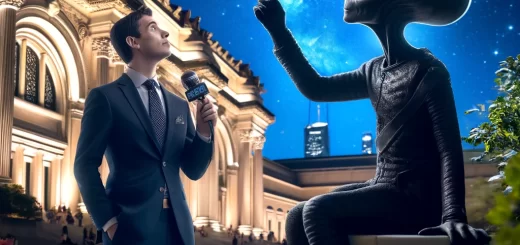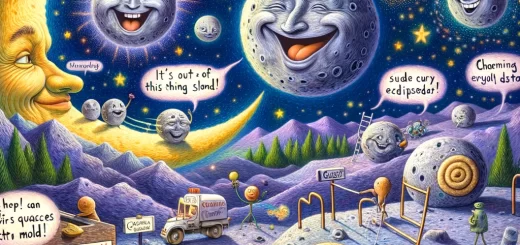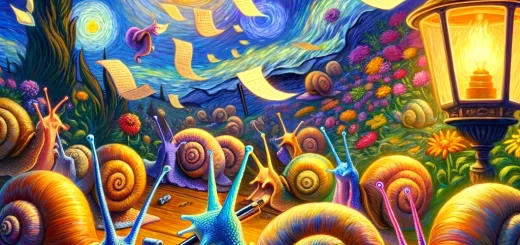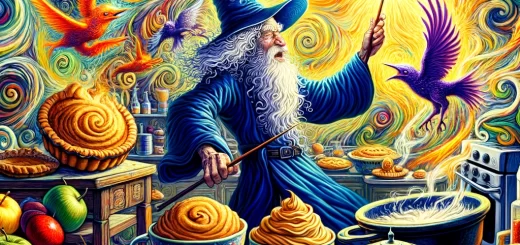Blaise Pascal Quotes

Enjoy the best of Blaise Pascal quotes. Quotes by Blaise Pascal, French Philosopher.
Men never do evil so completely and cheerfully as when they do it from religious conviction.
The heart has its reasons which reason knows not.
People almost invariably arrive at their beliefs not on the basis of proof but on the basis of what they find attractive.
Kind words don’t cost much. Yet they accomplish much.
All of humanity’s problems stem from man’s inability to sit quietly in a room alone.
Do you wish people to think well of you? Don’t speak well of yourself.
When we are in love we seem to ourselves quite different from what we were before.
The last thing one discovers in composing a work is what to put first.
Noble deeds that are concealed are most esteemed.
Few friendships would survive if each one knew what his friend says of him behind his back.
Nature is an infinite sphere of which the center is everywhere and the circumference nowhere.
Man’s greatness lies in his power of thought.
The only shame is to have none.
Imagination decides everything.
Law, without force, is impotent.
Men blaspheme what they do not know.
Evil is easy, and has infinite forms.
The gospel to me is simply irresistible.
Eloquence is a painting of the thoughts.
We never love a person, but only qualities.
The struggle alone pleases us, not the victory.
A trifle consoles us, for a trifle distresses us.
All of our reasoning ends in surrender to feeling.
Love has reasons which reason cannot understand.
Earnestness is enthusiasm tempered by reason.
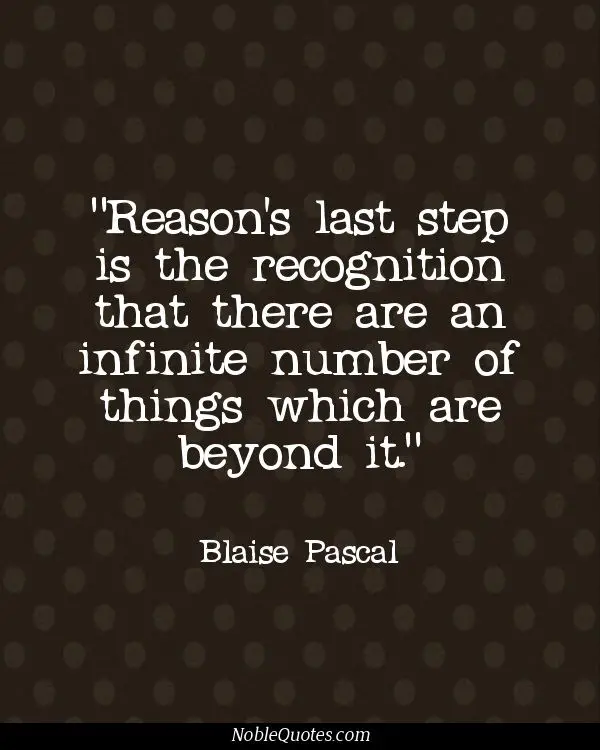
Continue reading these famous Blaise Pascal quotes below
People are usually more convinced by reasons they discovered themselves than by those found by others.
The supreme function of reason is to show man that some things are beyond reason.
We know the truth, not only by the reason, but also by the heart.
You always admire what you really don’t understand.
Nothing gives rest but the sincere search for truth.
We only consult the ear because the heart is wanting.
The knowledge of God is very far from the love of Him.
Our nature consists in motion; complete rest is death.
It is the fight alone that pleases us, not the victory.
Two things control men’s nature, instinct and experience.
The eternal silence of these infinite spaces frightens me.
Little things console us because little things afflict us.
To have no time for philosophy is to be a true philosopher.
Atheism shows strength of mind, but only to a certain degree.
Faith embraces many truths which seem to contradict each other.
Men despise religion. They hate it and are afraid it may be true.
Justice without force is powerless; force without justice is tyrannical.
It is not good to be too free. It is not good to have everything one wants.
Man is but a reed, the most feeble thing in nature, but he is a thinking reed.
Custom is our nature. What are our natural principles but principles of custom?
Small minds are concerned with the extraordinary, great minds with the ordinary.
Faith is different from proof; the latter is human, the former is a Gift from God.
We sail within a vast sphere, ever drifting in uncertainty, driven from end to end.
Human beings must be known to be loved; but Divine beings must be loved to be known.
Contradiction is not a sign of falsity, nor the lack of contradiction a sign of truth.
If all men knew what others say of them, there would not be four friends in the world.
Men are so necessarily mad, that not to be mad would amount to another form of madness.
Chance gives rise to thoughts, and chance removes them; no art can keep or acquire them.
The present letter is a very long one, simply because I had no leisure to make it shorter.
Happiness is neither without us nor within us. It is in God, both without us and within us.
Between us and heaven or hell there is only life, which is the frailest thing in the world.
The least movement is of importance to all nature. The entire ocean is affected by a pebble.
The charm of fame is so great that we like every object to which it is attached, even death.
If we examine our thoughts, we shall find them always occupied with the past and the future.
Too much and too little wine. Give him none, he cannot find truth; give him too much, the same.
We run carelessly to the precipice, after we have put something before us to prevent us seeing it.
It is incomprehensible that God should exist, and it is incomprehensible that he should not exist.
I have made this letter longer than usual, only because I have not had the time to make it shorter.
That we must love one God only is a thing so evident that it does not require miracles to prove it.
Justice and truth are too such subtle points that our tools are too blunt to touch them accurately.
We are only falsehood, duplicity, contradiction; we both conceal and disguise ourselves from ourselves.
If our condition were truly happy, we would not seek diversion from it in order to make ourselves happy.
If you gain, you gain all. If you lose, you lose nothing. Wager then, without hesitation, that He exists.
In faith there is enough light for those who want to believe and enough shadows to blind those who don’t.
The strength of a man’s virtue should not be measured by his special exertions, but by his habitual acts.
We view things not only from different sides, but with different eyes; we have no wish to find them alike.
I maintain that, if everyone knew what others said about him, there would not be four friends in the world.
Jesus is the God whom we can approach without pride and before whom we can humble ourselves without despair.
The sensitivity of men to small matters, and their indifference to great ones, indicates a strange inversion.
Words differently arranged have a different meaning, and meanings differently arranged have different effects.
Since we cannot know all that there is to be known about anything, we ought to know a little about everything.
Through space the universe encompasses and swallows me up like an atom; through thought I comprehend the world.
He that takes truth for his guide, and duty for his end, may safely trust to God’s providence to lead him aright.
The greatness of man is great in that he knows himself to be wretched. A tree does not know itself to be wretched.
Imagination disposes of everything; it creates beauty, justice, and happiness, which are everything in this world.
When we see a natural style, we are astonished and charmed; for we expected to see an author, and we find a person.
Truth is so obscure in these times, and falsehood so established, that, unless we love the truth, we cannot know it.
The greater intellect one has, the more originality one finds in men. Ordinary persons find no difference between men.
Faith certainly tells us what the senses do not, but not the contrary of what they see; it is above, not against them.
There are only two kinds of men: the righteous who think they are sinners and the sinners who think they are righteous.
Man’s true nature being lost, everything becomes his nature; as, his true good being lost, everything becomes his good.
Concupiscence and force are the source of all our actions; concupiscence causes voluntary actions, force involuntary ones.
Desire and force between them are responsible for all our actions; desire causes our voluntary acts, force our involuntary.
Justice and power must be brought together, so that whatever is just may be powerful, and whatever is powerful may be just.
It is the heart which perceives God and not the reason. That is what faith is: God perceived by the heart, not by the reason.
It is good to be tired and wearied by the futile search after the true good, that we may stretch out our arms to the Redeemer.
Nothing fortifies skepticism more than the fact that there are some who are not skeptics; if all were so, they would be wrong.
The consciousness of the falsity of present pleasures, and the ignorance of the vanity of absent pleasures, cause inconstancy.
I can well conceive a man without hands, feet, head. But I cannot conceive man without thought; he would be a stone or a brute.
Men often take their imagination for their heart; and they believe they are converted as soon as they think of being converted.
If man made himself the first object of study, he would see how incapable he is of going further. How can a part know the whole?
Faith indeed tells what the senses do not tell, but not the contrary of what they see. It is above them and not contrary to them.
One must know oneself. If this does not serve to discover truth, it at least serves as a rule of life and there is nothing better.
Nothing is as approved as mediocrity, the majority has established it and it fixes it fangs on whatever gets beyond it either way.
Nothing is so intolerable to man as being fully at rest, without a passion, without business, without entertainment, without care.
It is natural for the mind to believe and for the will to love; so that, for want of true objects, they must attach themselves to false.
Reason commands us far more imperiously than a master; for in disobeying the one we are unfortunate, and in disobeying the other we are fools.
Even those who write against fame wish for the fame of having written well, and those who read their works desire the fame of having read them.
Time heals griefs and quarrels, for we change and are no longer the same persons. Neither the offender nor the offended are any more themselves.
The last act is bloody, however pleasant all the rest of the play is: a little earth is thrown at last upon our head, and that is the end forever.
People are generally better persuaded by the reasons which they have themselves discovered than by those which have come in to the mind of others.
We like security: we like the pope to be infallible in matters of faith, and grave doctors to be so in moral questions so that we can feel reassured.
As men are not able to fight against death, misery, ignorance, they have taken it into their heads, in order to be happy, not to think of them at all.
The finite is annihilated in the presence of the infinite, and becomes a pure nothing. So our spirit before God, so our justice before divine justice.
Justice is what is established; and thus all our established laws will necessarily be regarded as just without examination, since they are established.
The weather and my mood have little connection. I have my foggy and my fine days within me; my prosperity or misfortune has little to do with the matter.
Our soul is cast into a body, where it finds number, time, dimension. Thereupon it reasons, and calls this nature necessity, and can believe nothing else.
There is a God shaped vacuum in the heart of every man which cannot be filled by any created thing, but only by God, the Creator, made known through Jesus.
Continuous eloquence wearies. Grandeur must be abandoned to be appreciated. Continuity in everything is unpleasant. Cold is agreeable, that we may get warm.
There are some who speak well and write badly. For the place and the audience warm them, and draw from their minds more than they think of without that warmth.
If we must not act save on a certainty, we ought not to act on religion, for it is not certain. But how many things we do on an uncertainty, sea voyages, battles!
The last proceeding of reason is to recognize that there is an infinity of things which are beyond it. There is nothing so conformable to reason as this disavowal of reason.
The immortality of the soul is a matter which is of so great consequence to us and which touches us so profoundly that we must have lost all feeling to be indifferent about it.
Can anything be stupider than that a man has the right to kill me because he lives on the other side of a river and his ruler has a quarrel with mine, though I have not quarrelled with him?
There are two kinds of people one can call reasonable: those who serve God with all their heart because they know him, and those who seek him with all their heart because they do not know him.
Habit is a second nature that destroys the first. But what is nature? Why is habit not natural? I am very much afraid that nature itself is only a first habit, just as habit is a second nature.
Truly it is an evil to be full of faults; but it is a still greater evil to be full of them and to be unwilling to recognize them, since that is to add the further fault of a voluntary illusion.
In each action we must look beyond the action at our past, present, and future state, and at others whom it affects, and see the relations of all those things. And then we shall be very cautious.
Vanity of science. Knowledge of physical science will not console me for ignorance of morality in time of affliction, but knowledge of morality will always console me for ignorance of physical science.
We conceal it from ourselves in vain – we must always love something. In those matters seemingly removed from love, the feeling is secretly to be found, and man cannot possibly live for a moment without it.
Belief is a wise wager. Granted that faith cannot be proved, what harm will come to you if you gamble on its truth and it proves false? If you gain, you gain all; if you lose, you lose nothing. Wager, then, without hesitation, that He exists.
Thus so wretched is man that he would weary even without any cause for weariness… and so frivolous is he that, though full of a thousand reasons for weariness, the least thing, such as playing billiards or hitting a ball, is sufficient enough to amuse him.
Liked these famous Blaise Pascal quotes? Then share them with everyone you know.
